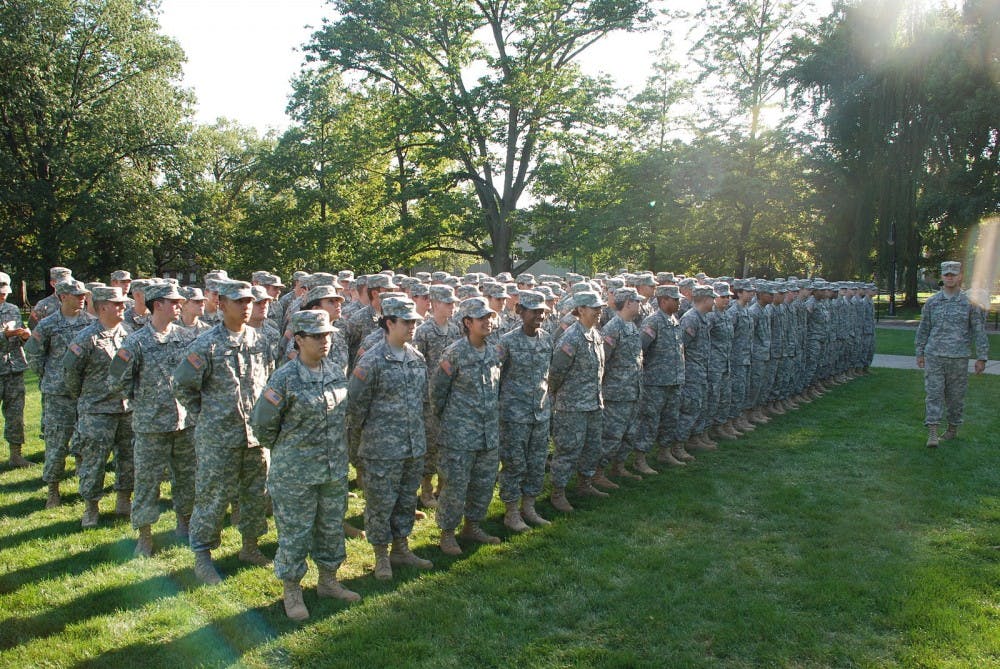Any given day on Grounds brings the chance of encountering the seemingly ubiquitous Reserve Officer Training Corps at the University. The assumption of a military recruitment program at universities is something that stands out as a brazen incorporation of the American military’s tentacles seeping into all aspects of life, yet it makes at least surface level sense. Considering that the cost of college makes it difficult for working-class and now even middle-class students to get a degree without accumulating massive amounts of debt, naval, army and airforce scholarships exist for students who want their college paid for with the quid pro quo of military service following graduation. In an economy that guarantees almost nothing, military service helps guarantee healthcare, housing loans and with ROTC, college for those willing to take part in an objectively destructive institution.
For those who oppose the destructive legacy of the U.S. military, ROTC represents a serious challenge. During the 60’s anti-war movement, efforts to expel ROTC programs succeeded at many elite universities in the country. Now, while some students protest against ROTC, efforts are hindered by the 1996 Solomon amendment — upheld in 2005 in Rumsfeld v. Forum for Academic and Institutional Rights — which said federal funds could be withheld if military recruiters or ROTC were banned from campuses.Thus, organizing against ROTC programs in colleges must take another path, especially because working-class and poor students can legitimately use these scholarships to get a college education and start a career that provides essential material needs.
However, opponents of the military industrial complex shouldn’t conflate the economic mobility that military service provides with a “pass” for enforcing the massive military complex that has laid waste to the world. Endless war in places like Afghanistan and Iraq have destabilized entire countries, and the U.S. military is responsible for at least the hundreds of thousands of civilians killed by the Iraq invasion alone. The task of weakening the military industrial-complex, ROTC included, is an urgent one. In order to combat an expansive military presence on Grounds and other schools, universal free-college should be a priority.
There are proposals like Bernie Sanders’ College for All act that would make college significantly more affordable by eliminating tuition at public universities and others that seek to address the rampant cost of higher education. The goal of free college is an important one, and one that can be directly tied to efforts to reduce the U.S. military. The 2019 military budget is $82 billion more than the 2017 budget, while tuition costs in America estimate at $70 billion per year. More than ever before, college degrees are seen as essential to getting a job that pays the bills. Considering that a college degree has become increasingly necessary, the need for free college is more important in today’s society. For someone to justify significant military spending when that money could be used to provide higher education is an insult to the 45 million Americans in student debt and the countless more that need a college degree but struggle to afford one.
There are rumblings of how progressive policies could more broadly cut into military recruitment and dependence. In Seattle, where the minimum wage ranges from $12-$15 an hour — depending how big the employer is — military recruitment is hard. The good news is that other progressive policies, such as Medicare for All, can be harnessed to take a anti-imperialist stance as well.
One of the benefits of being in the military — and by extent, doing ROTC — is that healthcare is provided by the Veterans Administration. Democratic socialist Alexandria Ocasio-Cortez correctly questioned the assumption that the U.S. can finance endless war and over 800 bases around the world but can’t seem to do the math on Medicare for All. Simply by juxtaposing Medicare for All and College for All with the resources spent on the military, the Left can deal a crucial blow to our ever expanding military and take the material incentives out of joining programs like ROTC.
Standing at over $700 billion, the United States’ military budget dwarfs the next seven largest militaries in the world combined. For so many companies, waging war around the world is big business, and the role of ROTC is to provide a path of upward mobility for working-class Americans in exchange for military service. The goal, ultimately, is that no one must take part in the American war-machine in order to progress society. There are alternatives — universal programs like College for All and Medicare for All can undercut the incentives that joining the military currently entails.
Jake Wartel is an Opinion Columnist for The Cavalier Daily. He can be reached at opinion@cavalierdaily.com.







